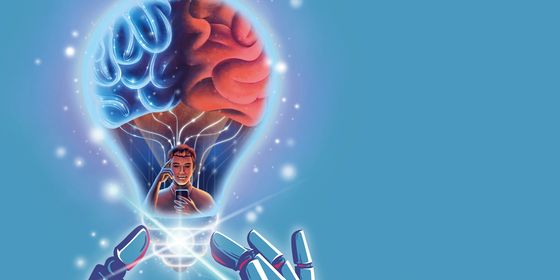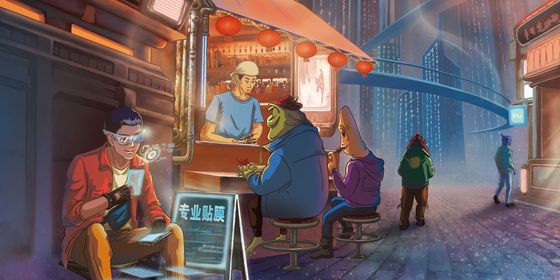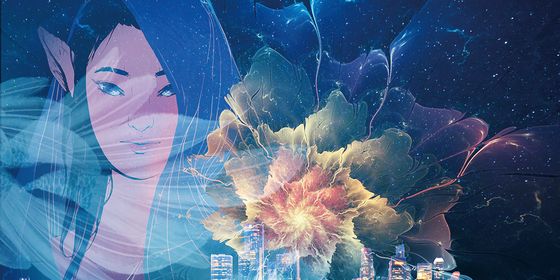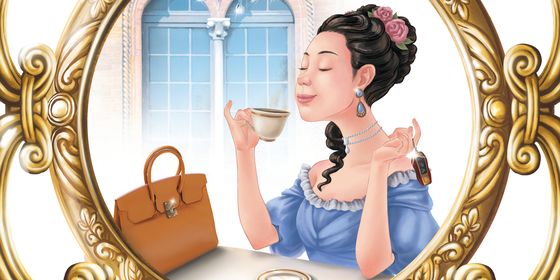Resurrecting Mongolian mythology with writer Surina
Author: Surina 苏日那
Born in 1992 to a traditional Mongolian family who pastured sheep and cattle on the steppes of Inner Mongolia, Surina is now a radio host in Changchun, Jilin province. She enjoys rock music and literature, and describes herself as an urban dweller whose inner child has settled permanently on the grassland. She began to write in 2010 and is a contracted author on Douban.com and a magazine columnist. Her fiction has been published on Douban and Qidian.com.
All those who have met Dalai Emch-nar (emch-nar means “doctor” in Mongolian) say he is a genius. He could make the blind see the blue sky and make the mute sing. He could grow new legs on amputees and make infertile women give birth to twins. How do you find him? Some people say that he is traveling around the world. One day he might be a blacksmith; another day a shepherd. Maybe he is sitting next to you.
One day Dalai Emch-nar traveled to the Zürkh River Ranch in the northern part of the steppes. Instead of a horse, he led a donkey. But not only did he not ride the donkey, he carried all his possessions himself and let the donkey trot along in leisure. The people who saw this whispered behind his back—why does he do all the work and let the animal rest? Dalai Emch-nar didn’t care. He just walked to the rancher’s house at a slow pace.
The hospitable rancher slaughtered cattle and lambs to welcome Dalai Emch-nar, but he only waved his hands and asked where he could find the lushest grass nearby. When he got the answer, he took his donkey there to graze. The ranch hands were all confused, but Dalai Emch-nar didn’t explain. He only said, “In three days, you will know the reason.”
At noon on the third day, Dalai Emch-nar brought his donkey to eat the lush grass as usual. By the time he returned, the ranch was in an uproar. The crying of the rancher’s wife could be heard throughout the whole ranch. The rancher’s 13-year-old son had fallen down from his horse and broken his rib while hunting. He was in his last gasps now, and no one knew how to save him. At this moment, Dalai Emch-nar led his donkey forward and said, “Slaughter this donkey, and take out the third rib on its left side.”
So Dalai Emch-nar’s cherished donkey was killed, its belly still full of fresh grass. Holding the donkey’s rib, Dalai Emch-nar walked to the bedside of the rancher’s son and replaced the human rib with the donkey’s. He threw the broken rib into a copper container and told the ranch hands to bury it together with the donkey in the place where the lushest grass grew. As soon as Dalai Emch-nar stitched up the wound, the rancher’s son woke up.
The rancher was deeply grateful to Dalai Emch-nar, and offered to give him half of his ranch. But Dalai Emch-nar just waved his hands again and said, “No, no. Just make sure that the place where you buried the donkey is covered by lush grass in the spring and summer, and clean snow in the winter. Only then can you preserve your son’s life. You also have to tell your son that he must never eat donkey meat or ride a donkey in the future.” After saying these words, he picked up his bags and continued his journey. After he left, all the people at the Zürkh River Ranch said, “That was the genius doctor—Dalai Emch-nar!”
After this, Dalai Emch-nar became a shepherd who herded sheep for a lord of the Juu-Uda League. The lord was extremely wealthy, but he had a younger brother who was a fool. How foolish was this brother? When he saw the birds in the sky, he said they were fish in the river. When he saw girls, he said they were men. When he heard the howling of wolves, he said this was his mother calling him home. The lord had spent much time and energy finding a way to cure his brother. He had asked all the doctors in the area to diagnose his brother’s illness, but none succeeded.
One day, a servant suggestedthat the lord should make an announcement that he would give the person who cured his brother’s illness fifty taels of gold, one thousand sheep, and one hundred horses as rewards. Dalai Emch-nar heard the announcement. As a shepherd, he couldn’t let the lord give away all his sheep, so he ran to the lord and asked, “Your honor! Your honor! Is it such a bad thing to be a fool? Why do you insist on curing him?” The lord wept and said, “My brother and I ate lamb tails and grew up together. We were like a pair of bull’s horns. How can I be happy if he is ill?”
Dalai Emch-nar was touched, so he said to the lord, “Your brother’s illness isn’t incurable, and you don’t need to give me gold, sheep, and horses. You just need to find a black sheep with white eyes, and then you can cure your brother’s illness.” The lord trusted him, so he asked his servant to find a black sheep with white eyes. But the servant didn’t believe Dalai Emch-nar. He thought Dalai Emch-nar wanted to swindle the lord, so he didn’t make any effort. After a whole year, he still couldn’t find a black sheep with white eyes.
One day, the foolish young lord ran off, and no one could find him even after a whole night’s search. His older brother was so worried that his hair turned white overnight. The next morning, though, to everyone’s surprise, the young lord came back on his own before the sun rose into the sky and the dew shone on the grass, leading a black sheep with white eyes. Seeing this, the lord was overjoyed. He sent for Dalai Emch-nar and dismissed the servant who was asked to find the sheep. Dalai Emch-nar asked the servants to kill the sheep and take out its brain, and then he replaced the young lord’s brain with the sheep brain. He also fed raw sheep eyes to the young lord.
Twelve days later, the young lord woke up, but everything he saw was turned upside down. The blue sky was below the green grass, and all the people walked on the sky. The young lord was so terribly frightened that he fainted away. His brother became extremely angry, so he decided to banish Dalai Emch-nar. But Dalai Emch-nar said, “Please fetch me a big wooden spoon used for making milk tea. It must be a wooden spoon that has been used for making milk tea for 20 years.”
This time, the lord didn’t trust anyone else, so he went searching for the spoon by himself and finally found it in the home of a childless blind woman. He offered the old woman some gold and brought her back to his palace to repay her for the wooden spoon. Dalai Emch-nar took the spoon and struck the back of the young lord’s head with it ten times a day. Like the hands of a clock revolving around, the world gradually righted itself in the young lord’s eyes.
A month later, the wooden spoon broke, and the world that the young lord saw also returned to normal, albeit a little slanted. From then on, he looked at everything with his head tilted to one side, but he was no longer a fool—he could distinguish not only between men and women, but also between birds and fish. When he heard the howling of wolves, he no longer said it was his mother calling him home. There was just one strange thing: He insisted that the blind old woman, who was brought back to the palace by the lord, was his mother.
Even so, the lord was overjoyed, and offered to share his throne with Dalai Emch-nar. Dalai Emch-nar waved his hands and said, “No, no. I just want a pregnant female sheep.” The lord happily agreed to his request and gave him a pregnant ewe. Dalai Emch-nar picked up his bags and led the sheep away. Before he left, Dalai Emch-nar told the lord that his brother should be prevented from looking into the mirror and the river in the future. These actions wouldn’t kill him, but might frighten him.
After Dalai Emch-nar left, the lord was curious about what he said, so he looked at his brother’s reflection in a copper mirror while he was sleeping. Then the lord got so frightened that he fell onto the ground—the thing he saw in the mirror was the head of a white-eyed black sheep.
Dalai Emch-nar led his pregnant ewe, shouldered his bags, and walked. Before they left the Gong Geer Grassland, the ewe gave birth. While Dalai Emch-nar delivered the lambs, a local bully robbed him of both his sheep and lambs. This man was the tyrant of the Gong Geer Grassland, and he was used to picking fights and robbing others. He had kidnapped dozens of women and had almost a hundred children by them. His sheep were as numerous as the clouds in the sky, and he had so many horses and cattle that they covered the grass when they grazed. One day, his favorite white horse became ill. When he saw Dalai Emch-nar delivering the lambs, he concluded that Dalai Emch-nar was a veterinarian and kidnapped him.
Knowing why he was kidnapped, Dalai Emch-nar quickly cured the white horse. The horse was ill because it had eaten some poisonous grass, so it recovered immediately when Dalai Emch-nar drew out the poison. From then on, the tyrant kept Dalai Emch-nar around and gave him a good job—treating his livestock.
One day, a group of people came to the Gong Geer Grassland calling themselves magicians. They begged the tyrant to let them perform in exchange for a bite to eat. The tyrant was intrigued, so he asked them, “What kind of magic can you do?” They answered, “We have the largest stomachs in the world. We swallow people and we can spit them back out.”
Saying this, they began their performance. The adults swallowed the children; the heavy people swallowed the slim people; the tall ones swallowed the short. Finally, there was only one person left standing before the tyrant. The tyrant asked, “How do you work your magic and let those people appear again?” That person opened his mouth, and spat out his companions one by one, and they again all stood before the tyrant. The tyrant was pleased with their performance, so he gave them some gold and asked them to stay. These magicians only had one requirement. They said that their magic would fade when the sun went down, so they could only perform during the day.
As time went on, the tyrant gradually got bored with their performance. One day, he came up with a new idea. He called all his wives and children over and asked the magicians to swallow them. Those magicians did so without any hesitation. The tyrant wasn’t satisfied, so he asked Dalai Emch-nar to lead all the cattle, sheep, and horses to him, and asked the magicians to swallow those as well. Unsurprisingly, these magicians swallowed all of the livestock. The tyrant was delighted. He clapped and shouted, and then asked the magicians to spit out his wives, children, and livestock. However, instead of obeying, the magicians turned around and ran. Startled, the tyrant ran after them, but he was no match against so many people, so he could only watch them escape.
Finally, the tyrant only had Dalai Emch-nar left with him. Dalai Emch-nar looked at the tyrant and asked, “If I bring your wives, children, and property back, can you promise me one thing?” Hearing this, the tyrant nodded eagerly, for he was willing to promise Dalai Emch-nar anything.
Dalai Emch-nar and the tyrant tracked these magicians to a temple. When the night fell, Dalai Emch-nar took out a pair of golden scissors and sneaked into the temple with the tyrant. The tyrant spent a long time searching in the temple, but found nothing. The magicians had disappeared, along with his wives and children.
Dalai Emch-nar told the tyrant not to worry, and led him to the prayer mats before the altar. Lifting them up, he found a few sacks underneath. They were the same color as the magicians’ clothing. Without saying a word, Dalai Emch-nar cut up the sacks with his scissors and then set the pieces on fire. A few agonized cries came from the fire, and if you looked carefully, you could have spotted blood streaming from it.
Everything was burnt out at last. The tyrant was deeply shocked and he asked Dalai Emch-nar what kind of beings those sacks were. Dalai Emch-nar answered, “Those magicians were sacks, which couldn’t do anything but carry things. Since they were placed beneath the mats before the altar, they had been worshiped by too many people and they gradually became spiritual beings. When they became chötgör [‘monster’ or ‘devil’ in Mongolian], they started to do evil and swallow people.”
Hearing this, the tyrant again became anxious and he asked, “Where are the things in those sacks? Where are my wives, children, and property?” Dalai Emch-nar smiled and said, “Don’t worry. You’ll know where they are when you return home.” When the tyrant came home, he found all his wives, children, and property there. He became exhilarated and asked Dalai Emch-nar what his request was—he would be willing to grant it no matter what it was.
“No, no. I just want my sheep and lambs back.” This request was easy to satisfy. The tyrant found the mother sheep and led it to Dalai Emch-nar. But there was a problem—all the lambs looked the same, so how could you find Dalai Emch-nar’s lambs among so many others? Dalai Emch-nar was not worried. Sitting beside the mother sheep, he started to milk it. All the lambs came to the sheep, but only two of them knelt down and suckled. The tyrant was pleased by this scene—Dalai Emch-nar really was a smart guy.
Before he left, Dalai Emch-nar told the tyrant, “You have enough property, so don’t rob any more people. Those sacks didn’t choose their victim randomly.” The tyrant took those words to heart, and shared most of his property with his clansmen and lived a happy life with his wives and children.
Dalai Emch-nar led his sheep and lambs, carried his bags, and continued his journey. Some people say he traveled to Ergun; some say he went to herd in a place where lush grass grew, and others say he became an official in the city.
But no one knows where Dalai Emch-nar will turn up next.
– Translated by Zhang Yuqing (张雨晴)
Fiction: The Doctor is a story from our issue, “Disaster Warning.” To read the entire issue, become a subscriber and receive the full magazine.












